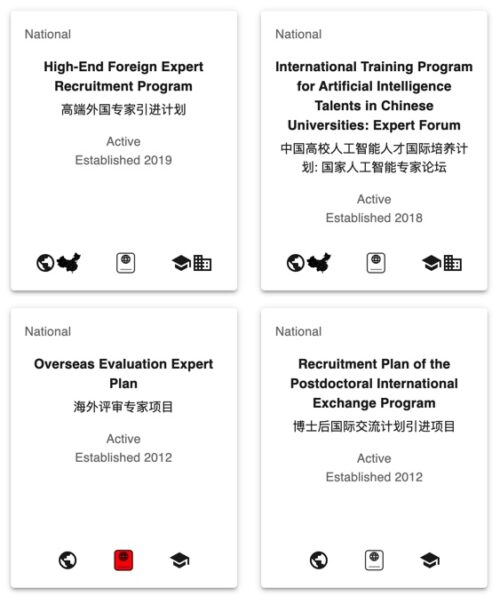The Chinese Talent Program Tracker is a catalogue of Chinese Party-State-sponsored initiatives aimed at cultivating China’s domestic talent pool in support of China’s strategic civilian and military goals. Viewed by Beijing as vital to Chinese economic and social development, talent programs aim to recruit everyone from experts to students of both Chinese and non-Chinese citizenship to fill positions across government, industry, defense, and academia to drive the innovation and growth of the Chinese economy. These programs provide various incentives—monetary and otherwise—to convince individuals to serve Chinese goals from within the Mainland and overseas in ways that promote the theft and exchange of critical information. According to a 2019 Senate report, these talent programs violate US research values and target US basic research, thereby severely impacting US competitiveness and the US economy.1
The information in this catalogue, as described in Chinese documents, resulted from analysis of primary Chinese sources publicly available on PRC ministry and government websites, state-owned media sources, and Chinese university websites. It is not meant to provide a comprehensive assessment of individual talent programs. Rather, it aims to make this information more accessible to the general public so they can have a better understanding of the depth and breadth of China’s talent initiatives.
Chinese talent programs like the Thousand Talents Plan (千人计划) are understood to differing degrees across various government departments in the United States and abroad. Recent Justice Department indictments and Congressional reports demonstrate that The Thousand Talents Plan in particular has come under increasing scrutiny in recent years.23 However, Chinese talent initiatives far exceed the scope and scale of Thousand Talents. In addition to the 43 national-level programs in this tracker release, we have also found information on more than 200 talent programs at sub-national levels, and the number is growing and shifting constantly as Beijing seeks to retain, manage, and recruit talent globally.
This tracker is an interactive tool meant to help inform policymakers, researchers/academics, and journalists navigate the vast landscape of Chinese talent programs. It should be used to inform discussions about China’s domestic and overseas talent flows and initiatives. For example, users can narrow down talent programs that require advanced degrees versus those that do not. Additionally, users may filter down to a more granular level to assess talent programs that target overseas Chinese citizens versus those looking to attract foreigners.
For each talent program, we attempted to find the following information:
- Program name
- Oversight body
- Year established
- Average target number of participants per year
- Whether still active or absorbed
- Target audience (Domestic within China or Overseas)
- Citizenship requirement
- Intended sector (Commercial, Government, or Academia)
- Duration
- Residency requirement
- Degree requirement
- Age requirement
- Benefits to participants
Not all categories were filled for each program. Within the tracker, this information is summarized with a “baseball card” view as in the image below, which can be expanded to reveal the full set of program metadata, along with sources, translations, and notes:

If you have additional information on a program or see an error, please submit information via this Google Form. The tracker will be updated periodically.
The author is grateful to Alex Bowe and Joy Ma for their expertise. In addition, the author would like to thank Igor Mikolic-Torreira, Dewey Murdick, James Dunham, Remco Zwetsloot, Ryan Fedasiuk, Dahlia Peterson, Rita Konaev, Melissa Flagg, Anna Puglisi, Rebecca Kagan, Daniel Hague, Alexandra Vreeman, and Lynne Weil for their suggestions on style and content, and Rebecca Gelles for a technical review.
Visit the China Talent Tracker.
- Homeland Security and Governmental Affairs Permanent Subcommittee on Investigations, “Threats to the U.S. Research Enterprise: China’s Talent Recruitment Plans” (Washington, DC: U.S. Senate, 2019), https://www.hsgac.senate.gov/imo/media/doc/2019-11-18%20PSI%20Staff%20Report%20-%20China’s%20Talent%20Recruitment%20Plans.pdf
- Office of Public Affairs, “Harvard University Professor Charged with Tax Offenses,” U.S. Department of Justice, July 28, 2020, https://www.justice.gov/opa/pr/harvard-university-professor-charged-tax-offenses
- Homeland Security and Governmental Affairs Permanent Subcommittee on Investigations, “Threats to the U.S. Research Enterprise: China’s Talent Recruitment Plans” (Washington, DC: U.S. Senate, 2019), https://www.hsgac.senate.gov/imo/media/doc/2019-11-18%20PSI%20Staff%20Report%20-%20China’s%20Talent%20Recruitment%20Plans.pdf
